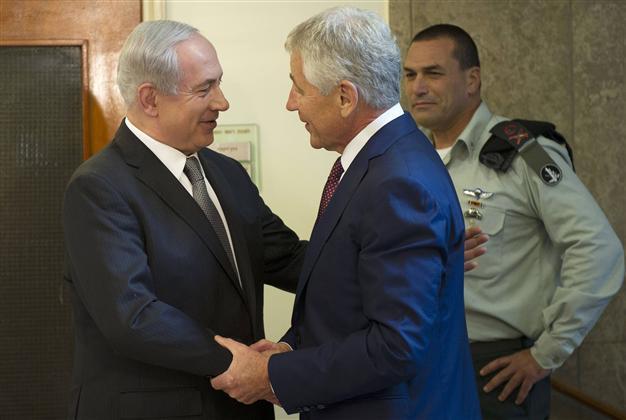Israel in Syria chemical arms claim as Hagel visits
JERUSALEM - Agence France-Presse

U.S. Defense Secretary Chuck Hagel (C) is greeted by Israel's Prime Minister Benjamin Netanyahu (L) at his office in Jerusalem April 23, 2013. REUTERS photo
The Israeli army on Tuesday said Damascus had used chemical weapons as US Defence Secretary Chuck Hagel wrapped up a three-day visit focused on the Syrian civil war and the Iranian nuclear threat.
The remarks were made by a top official in Israel's military intelligence as Hagel met with Israeli Prime Minister Benjamin Netanyahu shortly before departing for a brief visit to Jordan.
"To the best of our professional understanding, the regime (of Syrian President Bashar al-Assad) has made use of deadly chemical weapons against the rebels in a number of incidents in the last few months," said Brigadier General Itai Brun, head of the research and analysis division of military intelligence.
Speaking to delegates at a Tel Aviv security conference, he cited an incident on March 19 in Aleppo province in which 31 people were killed, pointing to the physical symptoms suffered by those in the area at the time.
"The reduced pupils, the foam coming out of the mouth and other additional signs provide evidence that deadly chemical weapons have been used," he said, indicating the symptoms were observed in photographs taken of the affected area.
"Which chemical weapons? Apparently sarin. The regime is also using chemical weapons that neutralise and are not fatal," he added.
There was no immediate comment from Hagel's entourage on the claim, which was made shortly
before the delegation took off for a brief stop of several hours in Jordan ahead of a visit to Riyadh.
Washington has said the use of chemical agents in Syria would be a "game changer" but it has yet to reach a definitive conclusion on the issue, Hagel said on Monday.
"Currently our intelligence agencies are assessing what happened and what did not happen," he said, refusing to discuss "contingency options" if the use of chemical agents was confirmed.
Developed as a pesticide in Germany in 1938, sarin is a deadly and volatile nerve agent that is colourless and odourless.
Hagel landed in Amman shortly before 1030 GMT and the war in Syria was likely to be a central element of his talks with army chief General Masbal al-Zaben.
Last week, the Pentagon chief revealed that some 150 US military specialists had been deployed in Jordan since last year and that he had ordered a US military team to bolster the mission, bringing their total to more than 200 troops.
Their aim is to help secure chemical weapons that many fear could fall into the hands of Islamist militants fighting the Assad regime, and to prepare for a possible spillover of the syrian conflict.
Ahead of his morning meeting with Hagel, the Israeli leader alluded to the Iranian-backed transfer of advanced arms from Syria into militant hands, and stressed that the Jewish state would do whatever it takes to defend itself.
"Nowhere are these (shared US-Israeli) values and interests challenged more than by the arming of the terrorist groups by Iran with sophisticated weapons, and equally Iran's attempt to arm itself with nuclear weapons," Netanyahu said.
"This is a challenge that Israel cannot accept, and as you and President (Barack) Obama have repeatedly said, Israel must be able to defend itself, by itself, against any threat." Hagel was quick to agree. "This is a difficult and dangerous time, this is a time when friends and allies must remain close, closer than ever," he told the Israeli leader.
Netanyahu's remarks came a day after Defence Minister Moshe Yaalon implicitly confirmed Israeli involvement in a January strike on a weapons convoy in Syria which was understood to be heading to Lebanon's Hezbollah, saying Israel had "acted" to stop advanced weaponry reaching militants.
The Shiite militia group and the Syrian regime of Assad are both close allies of Iran and avowed enemies of Israel.
Addressing the January 30 strike, the Israeli military intelligence analyst said the target of the strike was Russian-made SA-17 anti-aircraft missiles which were en route to Lebanon's Hezbollah.
"The SA-17 missile launchers that were bombed in Syria were going to be transferred to Hezbollah," Brun said, his remarks published on Haaretz's website.
After his brief stopover in Jordan, Hagel will continue on to Riyadh, Cairo and Abu Dhabi.
One of the main objectives of his trip is to the finishing touches on a multi-billion dollar arms deal which will see the sale of advanced US missiles, radar and aircraft to Israel, missiles to Saudi Arabia and F-16 fighter jets to the United Arab Emirates.
